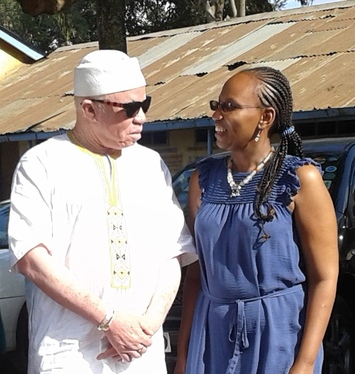 Members of the Ghetto Classic Orchestra rehearse as they wait for Salif Keita who visited them on Monday 24th August.
Members of the Ghetto Classic Orchestra rehearse as they wait for Salif Keita who visited them on Monday 24th August. Those who follow me on social media know that the story of my husband and I and our recent wedding has now gotten onto national media. The response has been overwhelming. we’ve gotten calls, emails and inbox messages from men and women, some saying that our story has moved them to tears, others saying that our story has encouraged them and given them hope. Not hope to get married in particular, but just hope that miracles happen, that love prevails, and that we can do things differently.
But there’s been another story that has just been as moving for me, and which I don’t know if I’ll tell as compellingly – that of music.
On Saturday, we got to hear the performance of the Orchestra. It was wonderful to see the kids enjoy the music. You should have seen the bass player swaying her head as she played a rendition of Tshala Muana’s “Karibu Yangu.” It was so totally worth it.
Salif Keita visits Ghetto Classics
Then this week, I was asked to do the translation for Salif Keita, who arrived in Nairobi as the guest artist for the Safaricom Jazz Festival. I was pleased to work with Alain-Michel Ndayishimiye, fondly referred to as Michou, a dear friend and a talented photographer who gave us the photo we used as our wedding invite. On Tuesday, we were meeting with Salif Keita at Ghetto Classics, a project at St John’s Catholic Church in Korogocho.
For us, the sight of the surrounding poverty was quite moving. But being at the church was like being in heaven. Elizabeth explained to us how the project was built on land reclaimed from the Mukuru dump site, and how the Ghetto Classics project has changed the lives of the children. Through learning instruments, practicing and playing together, the children learn discipline, team work, focus and care for one other. They often come together to help when one of them is in trouble. They also get to leave the confines of Korogocho and travel to all parts of Kenya – like Kisumu where they were recently for the music festivals and where they bagged some awards. A few of the older students, referred to as the “Seniors,” are now pursing degrees in varied areas like vet medicine, music and business at various universities.
 Salif Keita talks to Ghetto Classics Director Elizabeth Njoroge
Salif Keita talks to Ghetto Classics Director Elizabeth Njoroge The auditorium was like a pocket of heaven. Although the problems of the slums still filtered in, especially through a young man who was evidently high, there was a sense that this was a safe space where people could temporarily escape from hardship, think and listen to their souls.
Salif Keita was such a generous and respectful person. He stood throughout the session that the children introduced themselves. He was very moved. He said he had never seen music changing lives at such a real level. Later, he went to the primary school next door after the headmaster told us that the parents have decided to fundraise to repair the school premises, and that Ghetto Classics will also be making their contribution by holding a concert. Again, Salif was so moved, he promised to send the school €1,500. After signing the visitors’ book, he told Safaricom CEO Bob Collymore that he is a man with a big heart, and that he is doing a great thing to support such fundamental social change. Before he left, Salif insisted on taking a photo with Elizabeth.
And when you listen to Elizabeth talk about the kids, you can understand why Salif was so moved. As we waited for him to arrive for the Press meetings the next day, I sat next to her and she told me stories of individual kids with so much love. She fussed over Wycliffe, one of the saxophonists, and lamented with a chuckle about the poor cellos that were being twirled around as the orchestra played “Sukari” by Swahili Jazz Band. She fussed with a smile, like she was their mother, and even joked on stage about her fussing when she invited Wycliffe to come tell the audience about the impact of Ghetto Classics on the kids’ lives.
It was love so real, you could almost touch it.
 RSS Feed
RSS Feed
